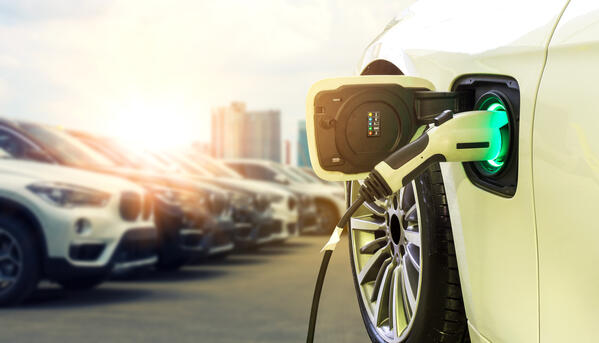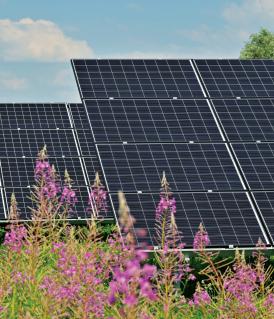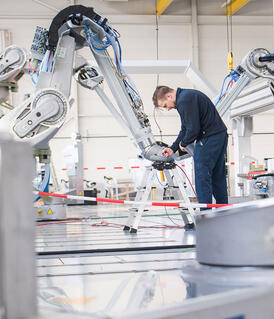Greentech – A Sector with a Future

Germany’s leading role in technologies for environmental protection, renewable energies and the efficient use of resources is having a positive impact on the economy and the labour market. The environmental sector makes a relevant contribution to sustainable growth and the development of new technologies – not just in the energy sector but also in the field of information and communication technology and materials technology.
Hundreds of thousands of people are employed in the energy industry, many of them working in the renewable energy sector. Between 2000 and 2021, the number of jobs in the renewable energy sector roughly tripled, with some 344,100 people employed in this area in 2021.
Environmental technology and companies specialising in this field are playing an increasingly important role in Germany as a whole. Their share of gross domestic product is 15 percent – and the trend is upward. The industry as a whole is dominated by medium-sized companies, but global corporations like Siemens are also key players. These companies are achieving considerable export Export Germany is one of the leading export nations. In 2022 it exported goods and services valued at some 1,576 billion Euros. The balance of foreign trade fort he year posted a surplus of 81 billion Euros. Germany has above all the strong performance of its industry to thank for its strength in exports… Read more › success with the label “Greentech made in Germany”. Germany is now launching an “ Export Export Germany is one of the leading export nations. In 2022 it exported goods and services valued at some 1,576 billion Euros. The balance of foreign trade fort he year posted a surplus of 81 billion Euros. Germany has above all the strong performance of its industry to thank for its strength in exports… Read more › Initiative Environmental Protection” so as to further improve its standing, in particular positioning itself as an integrated solution provider.
Electromobility will be an important future issue in the environmental sector
Electromobility is crucial to the environmental sector: the aim is for it to provide an additional boost in this area. The Federal Government Federal Government The Federal Government and cabinet is made up of the Federal Chancellor and the Federal Ministers. While the Chancellor holds the power to issue directives, the ministers have departmental powers, meaning that they independently run their respective ministries in the framework of those directives… Read more › and the automotive industry are pursuing the ambitious goal of developing Germany into the lead market for electromobility so as to be able secure a share in the potential offered by this global market. By 2030, the Federal Government is looking to have at least 15 million fully electrically powered passenger cars on Germany’s roads. The increasing number of electric cars is to contribute to a further reduction of greenhouse gas emissions Greenhouse gas emissions Roughly two thirds of global warming caused by humans (anthropogenic) can be attributed to carbon dioxide emissions. The gas is produced when the fossil fuels gas, oil and coal are burned. They all contain carbon which combines with atmospheric oxygen to form carbon dioxide. In addition to carbon… Read more › : after all, one fifth of these are caused by road traffic. In order for the e-mobility breakthrough to succeed, Germany needs a sufficient number of public charging stations. For this reason, a total of one million charging points are to be available by 2030. In addition, the Federal Government has developed a new overall strategy: the “Charging Infrastructure Masterplan II” involving a total of 68 measures. This aims to accelerate the installation and operation of charging points, making the process simpler and more convenient. In addition, charging infrastructure is to become more attractive as a business model and encourage more private sector investment.
German car manufacturers are also working intensively on e-mobility concepts and investing large sums in research and development.
Making local public transport more attractive
The Federal Government Federal Government The Federal Government and cabinet is made up of the Federal Chancellor and the Federal Ministers. While the Chancellor holds the power to issue directives, the ministers have departmental powers, meaning that they independently run their respective ministries in the framework of those directives… Read more › also wants to make local public transport more attractive, not least with the introduction of a so-called Deutschlandticket (“Germany ticket”). The aim here is to enable travellers to use all regional and local public transport buses and trains throughout Germany for a fixed monthly fee. The Deutschlandticket is also intended to significantly increase the appeal of public transport, making the switch from cars to buses and trains more attractive so as to help meet climate targets.
At the same time, the Federal Government has significantly increased spending on energy research, investing 1.3 billion euros in this area under its 7th Energy Research Programme. The focus here is primarily on research into batteries for electric cars. Considered a flagship project, “Battery 2020” aims to produce new and evolutionary materials for researching and developing the most powerful battery systems.
What is more, approximately 1,000 innovative new degree programmes have been created in the field of renewable energies and energy efficiency at German and European higher education institutions which are attracting large numbers of international students.


